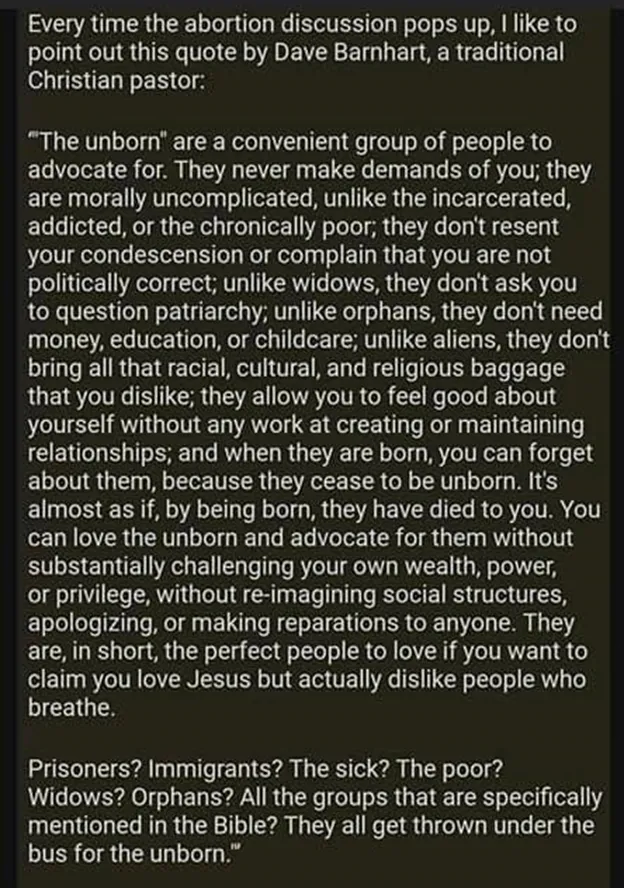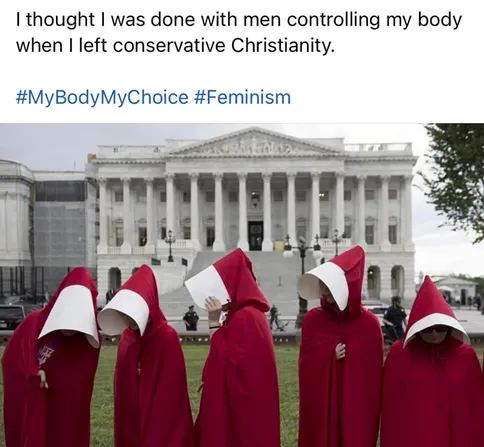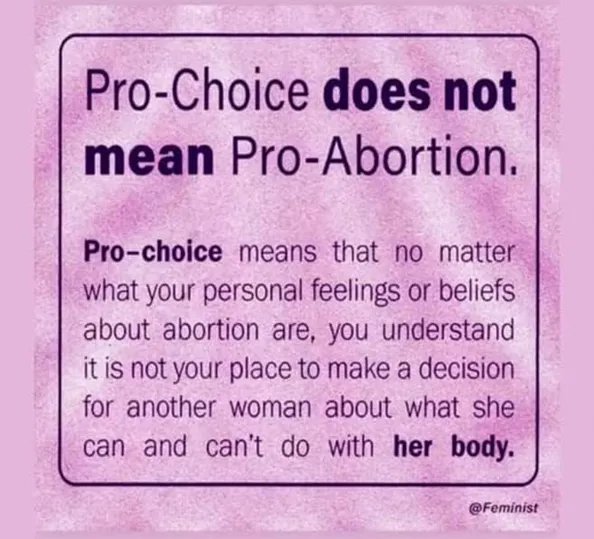By Natasha Crain
With the leaked Supreme Court draft opinion potentially pointing to Roe v. Wade being overturned, social media is on fire with pro-choice advocates sharing memes intended to portray abortion “rights” as necessary, important, and even morally good.
For those of us who believe intentionally killing preborn human beings is murder (the unjustified taking of innocent human life), it’s absolutely heartbreaking to see so many people passionately advocating for the right to commit such an act. In response, many Christians have taken to private social media groups to share examples of pro-choice memes and discuss how best to respond.
While it’s not necessary to respond to every post you come across (there aren’t enough hours in the day!), I’m heartened to see so many Christians wanting to address what they’re seeing. That said, I’ve noticed that many people’s responses are missing the key point of the debate as much as the memes themselves are.
As such, I wanted to write this article to respond to several viral pro-choice memes and show how to maintain focus on the core issue without getting pulled into irrelevant other subjects. But first, a critical distinction must be understood.
Distinguishing Worldview Disagreements from Logically Fallacious Red Herrings
Imagine that you come across someone posting the following on social media: “I’m an atheist. I do not believe anything exists beyond the natural world, and therefore I do not believe in the existence of objective morality. Nothing is morally right or wrong, so I’m pro-choice because I believe there’s nothing wrong with ending the life of an unborn baby.”
In this case, the pro-choice advocate is merely being consistent within their own naturalistic worldview. They believe morality is only a matter of opinion, given their view of the nature of the universe. If a Christian is pro-life as a logical outworking of their biblical worldview and an atheist is pro-choice as a logical outworking of their naturalistic worldview, the ensuing conversation isn’t so much about abortion as it is about their respective underlying worldview assumptions.
Worldview-level discussions about the nature of the universe, the nature of humanity, and the corresponding rights (or lack of rights) held by preborn humans certainly transpire in some circles. And these worldview-level questions are ultimately what the debate comes down to.
But this is rarely the level of conversation floating to the top of social media.
In fact, I’ve seen virtually no pro-choice social media posts addressing these questions in popular discourse. Rather, emotion-driven memes carry the day—memes that are nearly always logically fallacious red herrings. In other words, they distract from the real issue with points completely irrelevant to the core (worldview) question at hand:
Is it morally wrong to intentionally kill a preborn human being?
That’s it. That’s what the debate comes down to.
For clarity, the logic behind the answer for Christians with a biblical worldview is as follows:
- It’s morally wrong to intentionally kill an innocent human being.
- Abortion intentionally kills innocent human beings.
- Therefore, abortion is morally wrong.
With this in mind, let’s look at brief responses to eight of the most popular pro-choice memes circulating right now to see how to highlight the red herring and point back to the real issue. As we’ll see, they all fail to address the core question: Is it morally wrong to intentionally kill a preborn human being?
POPULAR PRO-CHOICE IDEA 1: If you really care about babies, you should be working to provide extensive government and/or business support for their lives (and their families’ lives) after birth (and for much longer).
Social media example:

If intentionally killing a preborn baby is morally wrong, whatever a person does or does not do to support a child and/or their parents does not change the morality of the action itself.
Virtually everyone, for example, would agree that rape is morally wrong. If a person opposed to rape does absolutely nothing for rape victims, we still acknowledge that their opposition to rape is the morally correct position to hold. Logically speaking, the morality of an action must be evaluated on its own basis. The core question remains: Is it morally wrong to intentionally kill a preborn human being?
[Avoid the trap: Don’t try to prove your motivations in response to the wording “if it was about babies…” If someone wants to question your motivations, they’re unlikely to be convinced otherwise by your words. The morality of abortion has nothing to do with any individual’s motivation for holding a given position. Also, don’t start breaking down each good we should supposedly provide (formula, diapers, etc.) to show why it’s unnecessary, unfeasible, or already sufficiently provided. All you’re doing is playing into the red herring.]
POPULAR PRO-CHOICE IDEA 2: Being “pro-life” means you should agree to a bundle of other social/moral positions assumed to be the best for human beings.
Social media example:

This is logically quite similar to the first meme, but with a twist that often confuses people: equivocation on the term “pro-life” (equivocation is the use of ambiguous language—typically using the same word with two different meanings).
Pro-life, in the context of the abortion debate, means that a person is opposed to abortion. Here the writer wants to make the political point that if you really care about “life,” you’ll agree with a bundle of other positions (ones they assume to be the best life-sustaining positions). But Roe v. Wade is not about a bundle of issues related to human life. This is a question of one specific human life issue.
Again, intentionally killing preborn babies is either morally wrong or it’s not. Whether someone takes a morally right or wrong position on any other issue is irrelevant to whether they’ve taken a morally right or wrong position on abortion.
[Avoid the trap: Don’t start trying to defend that you really are pro “all life,” but that being pro “all life” doesn’t translate into supporting each of the particular positions listed. If you start trying to prove your pro “all life” credentials by getting into detailed discussions on all these other issues, you’re simply playing into the red herring.]
POPULAR PRO-CHOICE IDEA 3: Caring about unborn babies is easier than caring about people already born.
Social media example:

The logic here is similar to that of the first two memes, but I wanted to include it because this one is especially popular, and it has a slightly different framing: It’s a “Christian” pastor presumably chastising fellow Christians for only caring about who is easiest to advocate for. Non-Christians of course like this because the accusation is coming from one of “our own.”
But regardless of who it’s coming from and regardless of how relatively easy or uneasy it is to advocate for any particular group, the morality of actions against that group remains the same.
That’s it. Even if advocating for the preborn were the easiest thing on earth relative to advocating for other groups, it doesn’t change whether intentionally killing those babies is morally wrong or not. If we’re talking about abortion laws, that’s the question that matters.
[Avoid the trap: Don’t get caught up in showing that this pastor is progressive and doesn’t hold a biblical view. That’s true, but the source of the comment is irrelevant. Also avoid debating how easy or uneasy it is to advocate for different groups—as I’ve shown here, that too is irrelevant.]
POPULAR PRO-CHOICE IDEA 4: Babies born to parents who can’t afford them, don’t want them, or otherwise are unready for them are better off being aborted.
Social media example:


The basic logic here is that it’s better to kill a preborn human than to allow that human to be born into bad circumstances, ranging from poverty to abuse. But many humans live in and always have lived in bad—often terrible—circumstances regardless of whether their parents wanted them. The pro-choice advocate would almost certainly not say that we should kill every human who lives in or will live in a set of circumstances deemed to be insufficiently pleasant. Imagine the outrage if our society started pulling toddlers out of the homes of poor families to kill them! The only difference between that scenario and the one in the meme is that the child is already born.
Again, it’s either morally wrong or it’s not to intentionally kill an innocent human being. Whether a given human’s parents want to or are able to raise that human according to certain standards has nothing to do with whether killing them is right or wrong. We wouldn’t apply that logic to humans who are already born; there’s no logical reason to apply it before birth either.
[Avoid the trap: Don’t enter into debate about how good a child’s life can be even in bad circumstances. The morality of abortion doesn’t depend on how good or bad a child’s life turns out to be. That’s another red herring.]
POPULAR PRO-CHOICE IDEA 5: Men have no right to tell a woman what she should or shouldn’t do with her body.
Social media example:

This idea comes in many different meme forms, but the basic logic is that men have no right to tell a woman what she should or shouldn’t do with her body because men can’t get pregnant. (As an aside, I’m not sure how long this argument can go unchecked today given that trans activists claim trans men–biological women–can be pregnant. Will feminists declare that there really are differences between trans men and biological men and allow trans men alone to speak, given their reproductive capabilities? Only time will tell.)
Once again, this avoids the question of the morality of abortion with an emotional red herring. Our society has laws against murder because we’ve collectively agreed that it’s wrong to intentionally kill an innocent human being; our laws unashamedly restrain the freedom of citizens to kill one another. It’s no more “controlling,” therefore, to have restrictions on what would-be murderers do with their bodies to kill others than it is to have restrictions on what pregnant women do with their bodies to kill others. The only relevant question is whether it’s morally wrong to intentionally kill a preborn human being, and the morality of an action doesn’t depend on the gender of who makes the law. (As many people have pointed out, it was an all-male Supreme Court that passed Roe v. Wade in the first place, so by this logic, pro-choice people should reject that court decision as well.)
[Avoid the trap: Don’t get distracted by the claim that “conservative Christianity” is about controlling bodies. That’s just a jab at Christians. Focus on the “my body, my choice” logic, which quickly fails for the above reasons.]
POPULAR PRO-CHOICE IDEA 6: No one has a right to tell a woman what she should or shouldn’t do with her body.
Social media example:

The logic here is identical to that of the last meme except it takes out the gender-specific language. Rather than “men have no right to tell women what to do with their body,” it’s “no one has a right to tell women what to do with their body.” Once again, we have all kinds of laws in society that restrict the use of one’s body to intentionally hurt or kill other humans. Abortion laws are not unique in telling someone what they can or can’t do with their body when it comes to other human lives.
The relevant question is whether it’s morally wrong to intentionally kill a preborn human being, not whether society is in a place to tell someone what they can or cannot do with their body. We already do that in all kinds of ways.
POPULAR PRO-CHOICE IDEA 7: Legally restricting abortion is classist and racist.
Social media example:

I’m always shocked that someone would make this argument, but it always comes up, so let’s look at the logic: We should keep the intentional killing of preborn human beings legal because if we don’t, certain racial and economic groups will be better able to find illegal ways to kill babies than others. In other words, poor people and people of color won’t have equal opportunity to kill.
We simply do not apply this kind of thinking in other cases—we don’t make actions legal because some groups of people are better able to skirt the law! If we did that, we’d probably have no laws at all. As a society, we work to provide equal opportunity for good not for bad.
The question, therefore, remains: Is it morally wrong to intentionally kill a preborn human being? If it is, there’s no need to give people equal opportunity to do what’s wrong.
[Avoid the trap: Don’t go down the rabbit hole of discussing which groups of people do or do not need abortion “access”—no one needs access to a moral wrong.]
POPULAR PRO-CHOICE IDEA 8: There are all kinds of bad circumstances leading women to seek abortion, so we can’t and/or shouldn’t make blanket restrictions on it.
Social media example (this is a copy and paste post that is viral around Facebook):
I’m not pro-murdering babies.
I’m pro-Becky who found out at her 20 week anatomy scan that the infant she had been so excited to bring into this world had developed without life sustaining organs.
I’m pro-Susan who was sexually assaulted on her way home from work, only to come to the horrific realization that her assailant planted his seed in her when she got a positive pregnancy test result a month later.
I’m pro-Theresa who hemorrhaged due to a placental abruption, causing her parents, spouse, and children to have to make the impossible decision on whether to save her or her unborn child.
I’m pro-little Cathy who had her innocence ripped away from her by someone she should have been able to trust and her 11 year old body isn’t mature enough to bear the consequence of that betrayal.
I’m pro-Melissa who’s working two jobs just to make ends meet and has to choose between bringing another child into poverty or feeding the children she already has because her spouse walked out on her.
I’m pro-Brittany who realizes that she is in no way financially, emotionally, or physically able to raise a child.
I’m pro-Emily who went through IVF, ending up with SIX viable implanted eggs requiring selective reduction in order to ensure the safety of her and a SAFE amount of fetuses.
I’m pro-Christina who doesn’t want to be a mother, but birth control methods sometimes fail.
I’m pro-Jessica who is FINALLY getting the strength to get away from her physically abusive spouse only to find out that she is carrying the monster’s child.
I’m pro-Vanessa who went into her confirmation appointment after YEARS of trying to conceive only to hear silence where there should be a heartbeat.
I’m pro-Lindsay who lost her virginity in her sophomore year with a broken condom and now has to choose whether to be a teenage mom or just a teenager.
I’m pro-Courtney who just found out she’s already 13 weeks along, but the egg never made it out of her fallopian tube so either she terminates the pregnancy or risks dying from internal bleeding.
You can argue and say that I’m pro-choice all you want, but the truth is:
I’m pro-life.
Their lives.
Women’s lives.
You don’t get to pick and choose which scenarios should be accepted.
Women’s rights are meant to protect ALL women, regardless of their situation!
I’ve saved this one for last because it’s like a capstone example for this article. I’ve seen so many Christians ask how to respond to this post, presumably because it looks so overwhelming. There are a dozen different types of cases given here, and the intent is clearly to confront the reader with too much to respond to. The writer wants to show that there are just too many difficult circumstances leading to a woman’s desire for abortion, so we shouldn’t make blanket restrictions; too many bad things exist that make abortion access necessary.
While the logical problems could be pointed out with each individual case (and I’ve seen people do that well), I think this is more simply and effectively dealt with by sticking with the high level logic the post is using: If difficult circumstances result in or from a human life being created, a woman needs the right to kill that preborn baby. To see the logical problem, apply that thinking to a human being already born…if difficult circumstances lead to one human wanting to kill another human, should we legalize that murder due to their difficult circumstances? As with an earlier meme, we don’t apply that logic in such cases. There’s no reason to apply it to the preborn either.
As one other logic point, to say that you’re not “pro-murdering babies” but are pro-women who want to be able to is a fallacy called distinction without difference. In other words, if you’re for women being able to kill a preborn baby, you’re “pro-(the ability to) murder babies.” Drawing a cursory distinction via word choice does not change the central issue of whether it’s morally wrong to intentionally kill a preborn human being.
[Avoid the trap: There are certainly nuances to some of the cases listed here that could warrant further points. For example, in the case of Vanessa, the baby has already died; that’s not about abortion at all. However, most people posting this aren’t looking to get into conversation about the details. Their whole point is that there are too many considerations that warrant conversation, so we should leave the choice to women. In general, I’d recommend avoiding the trap of replying to each case and stick with the overall points of logic I described here.]
Christians are called to speak truth, but sometimes before we can even speak truth about the sanctity of life, we need to help people see the flawed logic of popular claims. Once we sweep away logical errors so we can clearly see the core question (Is it morally wrong to intentionally kill a preborn human being?), we of course need to be prepared to make the case for life. For help in doing so, I highly recommend Scott Klusendorf’s book The Case for Life: Equipping Christians to Engage the Culture.
Recommended resources related to the topic:
Correct, NOT Politically Correct: How Same-Sex Marriage Hurts Everyone (Updated/Expanded) downloadable pdf, Book, DVD Set, Mp4 Download by Frank Turek
The Case for Christian Activism MP3 Set, DVD Set, mp4 Download Set by Frank Turek
You Can’t NOT Legislate Morality mp3 by Frank Turek
Fearless Generation – Complete DVD Series, Complete mp4 Series (download) by Mike Adams, Frank Turek, and J. Warner Wallace
_____________________________________________________________________________________________________________________________________________________
Natasha Crain is a blogger, author, and national speaker who is passionate about equipping Christian parents to raise their kids with an understanding of how to make a case for and defend their faith in an increasingly secular world. She is the author of two apologetics books for parents: Talking with Your Kids about God (2017) and Keeping Your Kids on God’s Side (2016). Natasha has an MBA in marketing and statistics from UCLA and a certificate in Christian apologetics from Biola University. A former marketing executive and adjunct professor, she lives in Southern California with her husband and three children.
Original Blog Source: https://bit.ly/3MFd1uY

















